Camponotus (Myrmotrema) grandidieri Forel
  Type location Madagascar
(Camponotus
Grandidieri n. sp., Forel, 1886c: ciii, major & minor
workers; Forel, 1892l: 232, male; Forel, 1912k: 166, queen) M
Grandidier - link below; see
Bolton,
1995) Type location Madagascar
(Camponotus
Grandidieri n. sp., Forel, 1886c: ciii, major & minor
workers; Forel, 1892l: 232, male; Forel, 1912k: 166, queen) M
Grandidier - link below; see
Bolton,
1995)
subspecies
atrabilis (Camponotus
(Myrmotrema) Grandideri For. var. atrabilis n. var., Santschi, 1915c:
273, minor worker) Madagascar
Ste Marie, Voeltzkow
comorensis (Campontus
(Myrmotrema) Grandideri For. var. comorensis n. var., Santschi,
1915c: 274, major & minor
workers) Comoro Is, H Pobéguin
mendax (Camponotus
foraminosus Forel sous-esp. mendax
n. subsp., Emery, 1895h: 54,
worker; note the other similarly named species, Forel, 1895e: 454,
major,
is from India) South Africa, Hamman's Kraal - see below
ruspolii (Camponotus
foraminosus Forel r. Ruspolii
n. stirps, Forel,
1892d: 349 - name only given; Menozzi, 1926a: 39, queen) Somalia,
coll. Ruspoli - see below
probably also unavailable names
rollei (Camponotus
foraminosus Forel subsp. ruspolii
Forel var. rollei n. var.,
Forel, 1910c: 270, major) South Africa,
Zoutspansberg, Transvaal, 800', Rolle - no images on Antweb (September
2014)
rubrolabiatus (Camponotus
(Myrmotrema) foraminosus For. r. ruspolii For. var. rubrolabiatus
n. var.,
Stitz, 1923: 165) Namibia, Okahandja, 27-28.iv.1911 - no images
on Antweb (September 2014)
all forms described  . .
|
Forel had mentioned the discovery and name earlier in
his description of foraminosus (see above, Forel, 1879a) - as
"described elsewhere" but the actual publication was not until 1886.
Forel's (1886c) description was
WORKER - TL 5.0-8.2 mm; close to foraminosus but with head
triangular and a larger propodeum (rather more like subgenus Colobopsis).
Integument of a delicate nature, with short legs and antennae which
break off easily.
Head triangular with rounded sides. Mandibles short and slender, with
hairs, six-seven teeth, numerous pronounced and deep puncturations,
very finely reticulo-striate between puncturations. Clypeus almost
rectangular, with near parallel sides, no carinae, extended forwards in
a very short rectangular lobe with a straight edge, cut away on each
side of the central lobe. Thorax strongly vaulted, especially
anteriorly. Gaster also large.
Thorax, gaster, whole of head and antennal fosses puncturate like a
thimble, the puncturation very dense, giving a microscopic granular
appearance. Legs and antennae, also cheeks in major, very finely
reticulate. Petiole scale and propodeal declivity finely and
transversely striato-puncturate. Hairs arise from the large deep round
punctures (hair pits) on the genae, the spaces between the punctures
are densely packed with smaller punctures each giving rise to a small
hair, giving the whole a carious (scaly) appearance.
The whole body is covered with coarse silvery pubescence, this is quite
short although longer on the gaster and slightly aligned, which with
the sculpture gives the ant a silky appearance. The antennae and legs
have a finer pubescence. A number of slender, erect white hairs are
scattered on the body, notably on the border of the petiole scale and
the gaster. The tibiae and scapes are without erect hairs.
Body matt black. Antennae (except the apex of the funiculus), tarsi,
tibiae, part of the femora, mandibles (other than the teeth on the
major) reddish. In the major the anterior border of the clypeus and the
genae also reddish.
From Madagascar, collector M Grandidier.
C. foraminosus has the same sculpturation, but has
an almost flat thorax (slightly vaulted) from front to back, a very
narrow propodeum, and fine yellowish-grey pubescence forming a pelt on
the gaster.
Emery's (1895h) description of mendax is at  . Forel's (1910c) description of rollei
is at . Forel's (1910c) description of rollei
is at  . Santschi's (1915c)
descriptions are at . Santschi's (1915c)
descriptions are at  . Stitz's (1923) description of rubrolabiatus
is at . Stitz's (1923) description of rubrolabiatus
is at  . Arnold (1924: 731) gave
translations, including rollei, these are at . Arnold (1924: 731) gave
translations, including rollei, these are at  . Menozzi's (1926a) description of the
queen of ruspolii is at . Menozzi's (1926a) description of the
queen of ruspolii is at  . .
|
See the Madagascar type at http://www.antweb.org/specimenImages.do?name=casent0101368
|
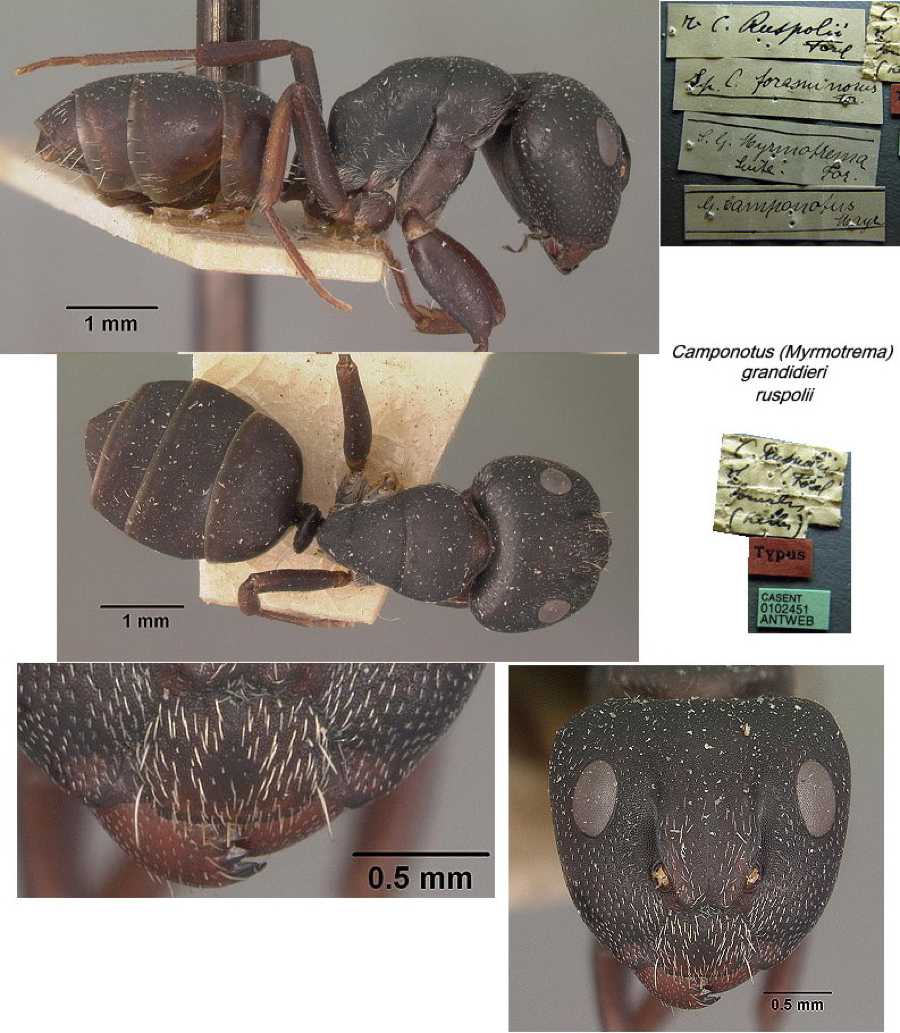 The
photomontage of ruspolii is
collated from http://www.antweb.org/specimen.do?name=casent0102451 The
photomontage of ruspolii is
collated from http://www.antweb.org/specimen.do?name=casent0102451
Collection Information: Specimen Code CASENT0102451; Locality Somalia:
[Somalis]; Collection codes: ANTC4664; Collected by: Keller
|
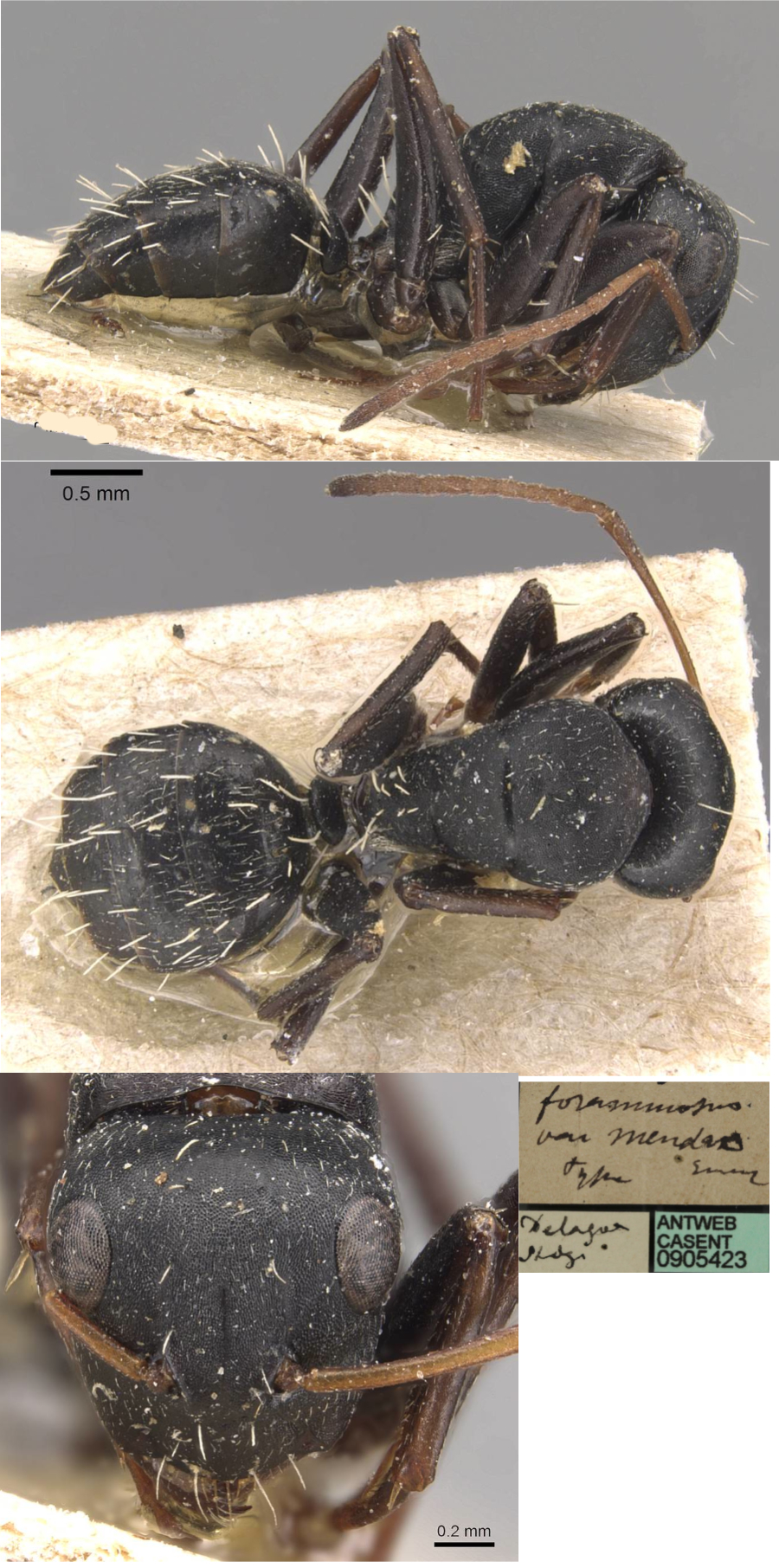 The
photomontage of a major worker of mendax,
as listed by Emery (1895h: 54)
is
collated from http://www.antweb.org/specimen.do?name=casent0905423 The
photomontage of a major worker of mendax,
as listed by Emery (1895h: 54)
is
collated from http://www.antweb.org/specimen.do?name=casent0905423
Note: Antweb list this as Camponotus foraminosus eumendax.
Emery wrote that he had not seen a minor worker of this form that, by
the sculpture and pubescence (pilosity?) imitatited exactly C. grandidieri Forel but the
alitrunk was as with C. olivieri and
the head more elongated than grandidieri.
It appears to me to be a minor worker of grandidieri.
|
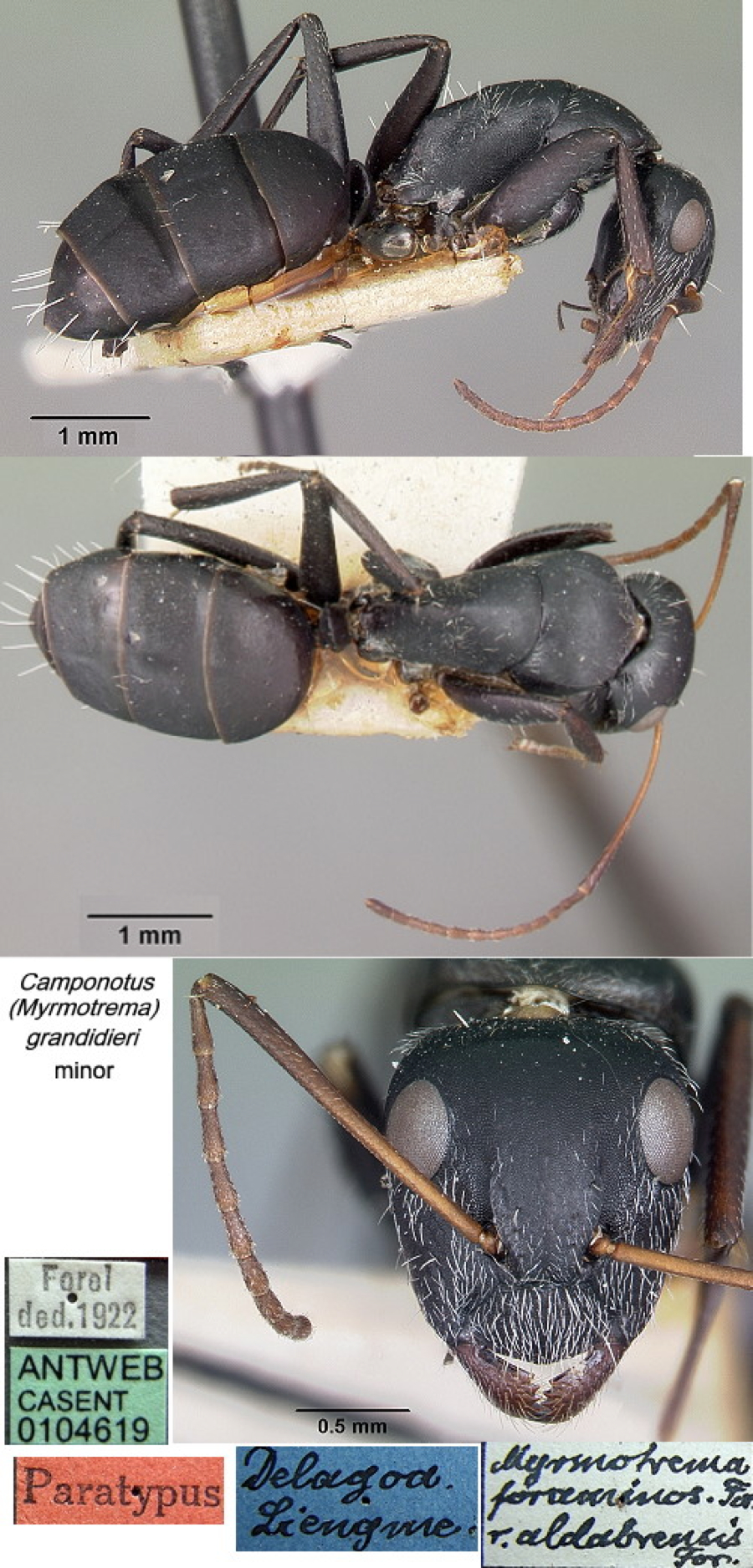 The photomontage is
collated from http://www.antweb.org/specimen.do?name=casent0104619 The photomontage is
collated from http://www.antweb.org/specimen.do?name=casent0104619
Collection Information: Specimen Code CASENT0104619; Locality
Mozambique: [Delagoa]; Collection codes: ANTC5989; Date: Collected by:
Liengme. This is labelled "Myrmotrema foraminosus aldabrensis"
but the propodeum profile shows the unevenness of grandidieri.
|
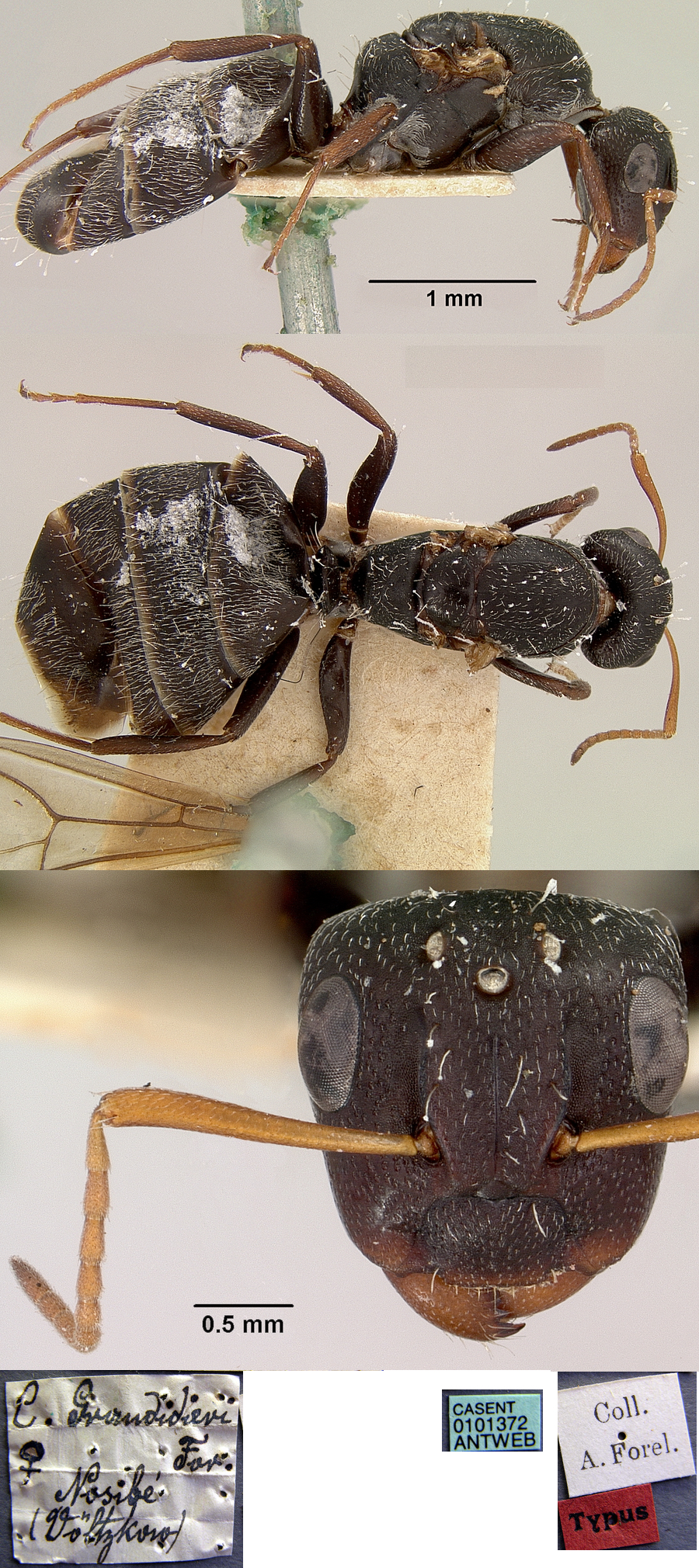 The
photomontage of a type collection queen is
collated from http://www.antweb.org/specimen.do?name=casent0101372 The
photomontage of a type collection queen is
collated from http://www.antweb.org/specimen.do?name=casent0101372
|
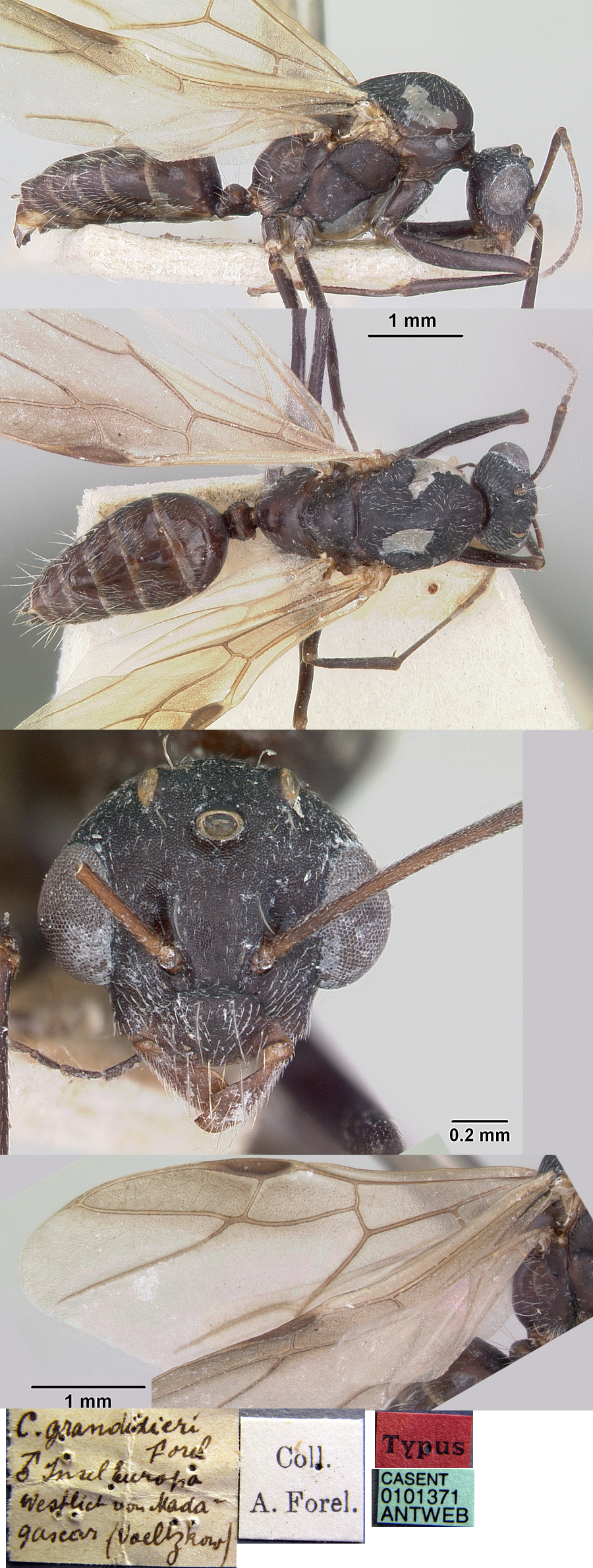 The
photomontage of a type collection male is
collated from http://www.antweb.org/specimen.do?name=casent0101371 The
photomontage of a type collection male is
collated from http://www.antweb.org/specimen.do?name=casent0101371
|
|